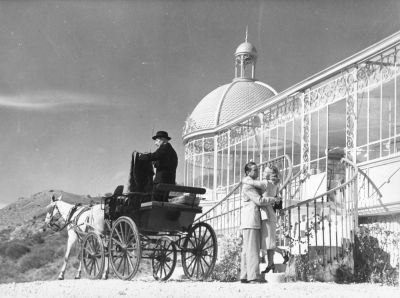
LUMIÈRE D’ÉTÉ
(Francia/1942) R.: Jean Grémillon. D.: 112'. V. francese
Con Lumière d'été, Grémillon propone una nuova variazione sul tema della coppia, soggetto centrale del suo cinema dopo Gueule d'amour. L'opposizione tra vita privata e vita sociale sviluppata in Remorques passa in secondo piano dietro la contraddizione fra desiderio di possesso e bisogno di libertà che esacerba la relazione amorosa. Come in L'Étrange Monsieur Victor e Remorques si ritrova il confronto fra una vecchia coppia, più o meno logorata, e una coppia che si sta formando. Ma la molteplicità dei personaggi di primo piano permette di costruire altre figure di coppia che sono altrettante variazioni fra questi due poli, e il racconto stesso conduce a una serie di modifiche nella composizione di queste figure. [...] Tranne l'episodio finale, il solo evento drammatico ha avuto luogo prima che inizi il racconto: si apprende che Patrice ha ucciso sua moglie e che ha contraffatto l'omicidio mascherandolo da incidente di caccia, con la complicità di Christiane. L'intrigo di Lumière d'été può riassumersi in una serie di cambiamenti nella composizione delle due coppie di partenza; le peripezie corrispondono ai diversi tentativi di nuove unioni, di cui alcune falliscono e una sola alla fine si stabilizza. Nessuna di queste coppie è 'legittima', il che favorisce i cambiamenti, ma ciò non può mancare di sorprendere nel clima morale molto pesante del regime di Vichy. Contrariamente a L'Étrange Monsieur Victor e a Remorques, la formazione e la dissoluzione delle figure di coppia sfuggono alla problematica dell'adulterio: la morale sociale svanisce dietro la morale individuale, il che dona una tonalità stranamente moderna a questo film.
(Geneviève Sellier, Jean Grémillon. Le cinéma est à vous, Meridiens Klincksieck, Paris 1989)
With Lumière d'été, Grémillon proposes a new spin on the couple, which became his central theme after Gueule d'amour. The tension between private and social life created in Remorques takes a backseat to the contradiction between the desire to possess and the need to be free that characterizes love relationships. Just as in L'Étrange Monsieur Victor and Remorques there is the contrast of an old couple, whose rapport is more or less tattered, and a new couple that is just forming. But the wealth of main characters allows the creation of additional sets of couples with many variations between these two poles, and the plot itself leads to a series of modifications to the composition of these sets. [...] Except for the finale, the only other dramatic event occurred prior to the beginning of the story: the audience learns that Patrice has killed his wife and has hidden the murder behind the façade of a hunting accident, with Christiane's help. The plot of Lumière d'été can be summarized as a series of changes in the composition of the two initial couples; the vicissitudes correspond to various attempts at the creation of new unions, some of which fail, and only one in the end becomes stable. None of the new couples are 'legitimate', which encourages more swapping, shocking material in the heavy moral climate of Vichy. Contrary to L'Étrange Monsieur Victor and to Remorques, the problematic aspect of the making and breaking of the couples is not the moral vice of adultery: social mores dissolve behind individual mores, which imbue the film with a strangely modern tone.
(Geneviève Sellier, Jean Grémillon. Le cinéma est à vous, Meridiens Klincksieck, Paris 1989)

Tariffe:
Aria condizionata
Accesso disabili
Tel. 051 522285











